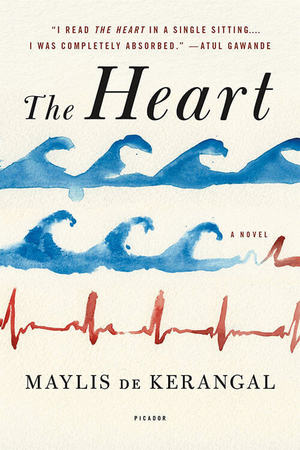Don’t think that knowing who dies early in the book will spoil the dramatic tension. Don’t think that because The Heart is essentially a transplant narrative will mean that it suffers from formulaic storytelling. Don’t think that its dedication to medical detail diminishes its very human depths. Or that its being a work of fiction keeps it from feeling relentlessly real. At times uncomfortably real.
The Heart, written in French by Maylis de Kerangal and translated into English by Sam Taylor, is gripping, riveting, compelling, powerful. The level of intensity comes partly because it is so beautifully written. The language is lyrical, potent, fastened tight to remarkable observations of in-the-moment detail.

As when the boys go surfing before sunrise: “In jeans and jackets, they crept outside without breakfast — not even a glass of milk or a bite of cereal, not even a slice of bread — and waited in front of their apartment building (Simon) or the gates of their house (Johan) for the van that was right on time (Chris), these boys who normally never emerge from their beds before noon, no matter how much their mothers nag them, these boys who usually don’t have the energy to do more than crawl lethargically from the living room couch to their beds and back, here they are in the street at six in the morning, champing at the bit, laces undone, breath foul — beneath the streetlamp, Simon Limbres watched the cloud of air that rose from his mouth as it slowly expanded, dissolved, and vanished, remembering how as a child he had liked to pretend he was smoking, putting his index and middle finger to his lips, taking a breath so deep it hollowed his cheeks, and blowing out like a man . . .”
The style is fast forward, with long-rolling sentences that gallop briskly over 24 hours of motion, along with thoughts, impressions, memories and stomach-punch human experiences:
“ . . . for while Simon Limbres’s heart, this human heart, is too much even for the machines, no one could claim to really know it, and that night, that starless and bone-splittingly cold night on the estuary and in the Pays de Caux, as a lightless swell rolled all along the cliffs, as the continental shelf retreated, revealing its geological bands, there could be heard the regular rhythm of the resting organ, a muscle that was slowly recharging, a pulse of probably less than fifty beats per minute, and a cell-phone alarm went off at the foot of a narrow bed, the echo of a sonar signal translated into luminescent digits on the touchscreen — 05:50 — and suddenly everything raced out of control.”
The friend who recommended The Heart to me, and sent me a copy, said its ending left her feeling breathless. I had similar sensations long before that. There were places in which I was so focused, so absorbed that I’d “wake” to realize my own body had tensed, my breath held, from the vicarious passages into a separate reality.
So it’s a quick read. Some 242 somewhat airy pages. Pausing only to introduce new characters, new members of the transplant team, doctors, nurses, technicians. Recipient. With enough three-dimensional sculpting to make them real, make them engaging, interesting even. Their lives — personal, diverse, authentically human — intertwining as the current speeds headlong toward its medical climax.
That climax, however, despite its vivid descriptions, the meticulous play-by-play, its power to bring a reader right into the hospital, the hallways, the operating room, all authoritatively reported, did not wield as strong a blow (to me) as the events that brought these disparate individuals together. And for that, for that sustained body shot, one need only be a parent. Or know love.
A book that is a good read is one thing. That in itself is a treasure — to be carried away on words, on prose, on storytelling that takes you out of your own head and into another’s, to another plane, lifts you out of your day, your worries, off your flashing screens.
But the power of The Heart comes, too, from its depths, because — even if it doesn’t come out and say it, but only conveys it through the sharp storytelling — it is a book about life, the full richness and momentary joy of life, of surfing and singing and knowing love, of youth and promise. Of carrying on as one goes deeper into life, into adulthood, persisting. It’s also about death. The unbearable pain of loss. The fragility of life. The way the world can come crashing down and be changed forever.
And about the human body. And the human race.
I read The Heart in a few days. But its presence, its impact has lingered. Sort of like the events in this singular, 24-hour period whose reach goes forward and backward in time, for a seemingly random collection of people, all because of a heart.
Kerry Temple is editor of this magazine.